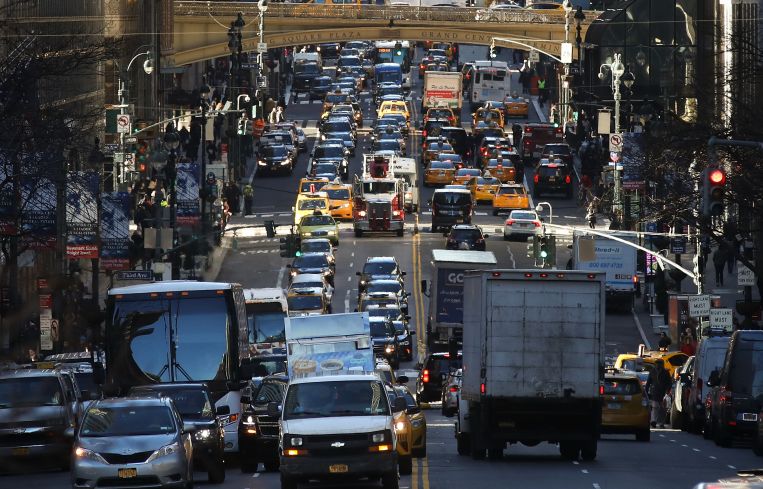Drivers Likely to Pay $15 to Get Into Busiest Areas of Manhattan
By Rebecca Baird-Remba November 30, 2023 12:54 pm
reprints
The group tasked with developing tolls for New York City’s controversial congestion pricing plan recommended charging drivers $15 to enter Manhattan below 60th Street.
The proposal — which the Traffic Mobility Review Board submitted to the Metropolitan Transportation Authority — would also toll trucks entering that zone $24 to $36, depending on the size of the truck.
The proposed tolls would apply to all vehicles between 5 a.m. and 9 p.m. on weekdays and between 9 a.m. and 9 p.m. on weekends and exclude the West Side Highway and the Franklin D. Roosevelt East River Drive. Tolls would be 75 percent lower overnight.
Congestion pricing would be the first tolling system of its kind to be enacted in the United States, and the MTA plans to launch the tolls in the middle of next year. The agency expects the program to generate $1 billion per year, which the MTA has said it will use to finance $15 billion worth of upgrades to the state’s aging transit infrastructure.
“Absent this, we’re going to be choking in our own traffic for a long time to come and the MTA is not gonna have the funds necessary to provide quality service,” said Carl Weisbrod, the chair of the Traffic Mobility Review Board, during a press conference announcing the proposed tolls. He said that he expects the number of vehicles in the congestion pricing zone to decline 17 percent as a result of the new fees.
“Congestion will also decline in the region as a whole,” he added. “The focus is on the [central business district] because that’s the center of our regional economy. But the benefits of congestion pricing go way beyond the CBD.”
Drivers entering the pricing zone can get a credit against the daytime rates if they’ve already paid to get into Manhattan via the Hugh L. Carey, Holland, Queens-Midtown and Lincoln tunnels, according to the report.
Those credits — which do not apply at night — would be $5 for passenger vehicles, $2.50 for motorcycles, $12 for box trucks and intercity buses, and $20 for large trucks and tour buses.
The proposal also calls to give a 50 percent discount to low-income drivers for their first 10 daytime trips each month if they register with the Triborough Bridge and Tunnel Authority.
Congestion pricing was introduced by then-Gov. Andrew Cuomo in 2017 and approved by the state legislature in 2019. It lay dormant under the Trump administration but finally picked up steam when President Joe Biden took office. The toll proposal was giving final federal approval in June.
The Traffic Mobility Review Board was tasked with holding a series of public meetings over the past year about the tolling program and collecting public feedback about toll pricing and exemptions.
Members include former Real Estate Board of New York President John Banks, developer and landlord Elizabeth Velez, Partnership for New York City President Kathy Wylde, and John Durso, the president of the Long Island Federation of Labor. John Samuelsen, the head of the Transportation Workers Union, recently resigned from the board but continues to support congestion pricing, Weisbrod said.
Transit advocates are thrilled to see congestion pricing finally become a reality.
“Congestion pricing will be a win-win-win for transit, traffic and air quality,” Danny Pearlstein of Riders Alliance said in a statement. “Riders have organized for years to make it a reality, and we eagerly await its implementation.”
However, the MTA still has to navigate some obstacles before congestion pricing takes effect. New Jersey Gov. Phil Murphy sued the federal government last summer to block the tolls and did not seem to warm up to the idea in a statement he released Monday night.
“Despite our interconnected and interdependent regional economy and transportation system, New York officials did not meaningfully consult with us from the outset and instead treated New Jerseyans as a convenient way to fill an MTA budget hole,” Murphy said in a statement. “As a conceptual matter, I support congestion pricing, as long as it is structured in a way that is fair to all sides. This plan is neither fair nor equitable.”
Rebecca Baird-Remba can be reached at rbairdremba@commercialobserver.com.



